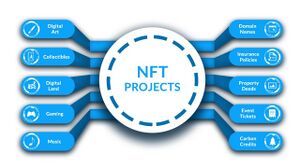Assets - NFTs
What is an Asset (NFT)?
Assets, commonly known as NFT's stand for non-fungible token. Assets are tokens that we can use to represent ownership of unique items. They let us digitally represent things like art, collectibles, even real estate and a lot of other things. They can only have one official owner (sigchain) at a time and they're secured by the Nexus blockchain; except the owner no one can modify the record of ownership.
An Asset can only have one owner (user account / sigchain) at a time. Ownership is managed through the uniqueID (Asset Name) and metadata that no other token can replicate. Assets are minted and are assigned ownership to the particular user account (Sigchain).
NFT's can be transferred to other users which transfers the ownership of the Asset to that particular user. Assets provide the use of mutable metadata like the "Owner Field" for a house which is minted as an asset. The new owner then can change the Owner field to reflect his name as the owner of the house.
Asset Properties
- Each Asset minted has a unique Name & Register Address that is directly linked to the owner (user account / sigchain).
- Assets are not directly interchangeable with other tokens 1:1. For example 1 NXS is exactly the same as another ETH. This isn't the case with Assets.
- Each Asset has an owner and this information is easily verifiable.
- Assets are native to Nexus and can be bought and sold on any Nexus powered Asset market or via the on-chain P2P marketplace.
- Asset metadata fields can be selected as mutable during minting and this metadata can be changed anytime by the owner of that Asset.
- Assets can be tokenised for fractional ownership.
Where can we use Assets?
Assets can be used for various use-cases both digital and physical. Listed below are a few use-cases:

Digital
- Digital Art
- GIFs
- Collectibles
- Music
- Videos
- Digital Land
Real World (Physical)
- Asset tokenization
- Property Deeds
- Deeds to a car
- Events & Ticketing
- Secure Digital Identity
- Legal documents
- Academic Credentials / Certificates
- Intellectual Property
- Ensuring Authenticity of Products
- Gaming: In Game Characters and Assets
- Physical Art
- Insurance
- Domain Names
This list is just the tip of the iceberg, there are a lot of ways to use Assets, creativity is the limit here.